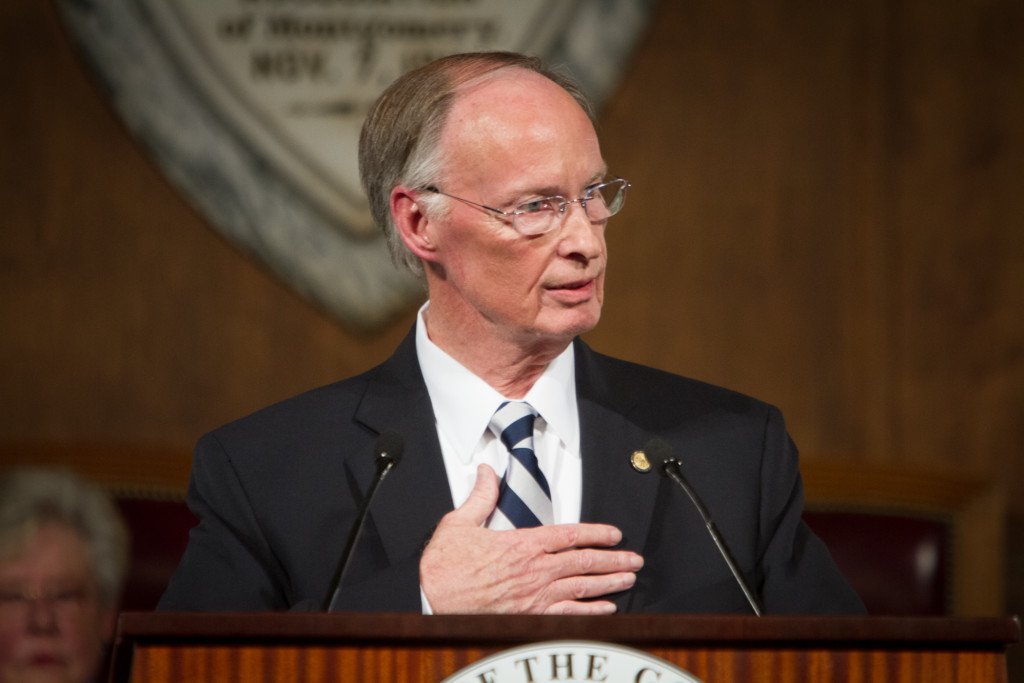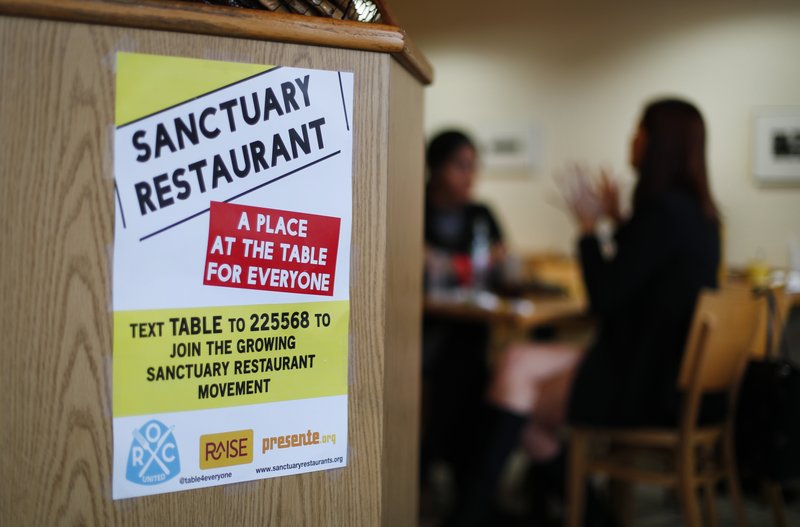Robert Bentley: Alabama will not support sanctuary cities that shelter illegal immigrants

Gov. Robert Bentley on Tuesday announced Alabama will not support sanctuary cities in the wake of a resolution passed by the Birmingham City Council. “President Trump has already taken decisive and necessary action to enforce our nation’s immigration laws,” Bentley said in a news release. “Alabama will not support sanctuary cities or institutions that harbor or shelter illegal immigrants, and are in clear violation of the laws of the nation.” The Birmingham City Council approved a resolution on Tuesday expressing support for illegal immigrants but not officially declaring the city a sanctuary — an official designation given to cities that follow certain procedures that shelters undocumented immigrants.
Restaurants: The next front for the immigration debate?

The national debate over immigration policy could be coming to a diner near you. From down-home delis to upscale bistros, dozens of restaurants nationwide are seeking “sanctuary” status, a designation owners hope will help protect employees in an immigrant-heavy industry and tone down fiery rhetoric sparked by the presidential campaign. First inspired by churches, the label is something cities and other public entities have sought to offer local protections to immigrants living in the U.S. illegally, whether it’s barring police from asking citizens about immigration status or refusing to cooperate with federal agents. Roughly 80 restaurants are participating, in locations including New York, Minneapolis, Detroit, Boston, Oakland, California, and Ann Arbor, Michigan. The restaurants agree to anti-discrimination policies, put up signs on windows that pronounce their sanctuary status and receive know-your-rights training, such as webinars on how to ask federal immigration agents for proper paperwork if there’s an attempted raid. Some will also offer a text line for customers or employees to report any incidents of harassment. At Detroit’s Russell Street Deli, customers walking in the front door of the racially diverse restaurant see a sign that reads: “SANCTUARY RESTAURANT, a place at the table for everyone.” “I have this one little place where I get to decide how people treat each other,” said owner Ben Hall, who is biracial and was moved to sign up after a few customers’ racially tinged comments. “If someone has the need to insult someone … then they don’t get to participate. I’ve told them, ‘There’s another diner next door.’” The movement is loosely defined and largely symbolic. Restaurants are private businesses subject to workplace law and regulations, and a sanctuary designation will do nothing to prevent federal agents from arresting any workers in the country illegally. But organizers of the sanctuary restaurants movement say it’s a response to the uncertainty surrounding how President Donald Trump will carry out campaign pledges to step up deportations and a build a wall along the Mexican border, among other things. Trump signed executive orders Wednesday aimed at jumpstarting construction of the wall and punishing cities that declare themselves sanctuaries for immigrants. Organizers of the movement say the restaurant industry is more vulnerable than others, given its heavy reliance on immigrant labor. Not all restaurant industry groups agree with the tactic. The National Restaurant Association, which represents roughly 500,000 businesses, is instead pushing for an immigration overhaul, including an updated verification system that confirms employees’ eligibility to work in the country legally. Association Senior Vice President Steve Danon said the organization “is looking forward to working with the Trump administration” on ways to make verification “easier and more cost-efficient.” Roughly 12 million workers are in the restaurant industry and immigrants make up the majority, including up to 70 percent in big cities such as New York and Chicago. An estimated 1.3 million in the industry are immigrants living in the country without legal permission, according to Restaurant Opportunities Centers United, which launched the campaign and works to improve industry conditions. They pitched the program with an economic argument, saying restaurants need a “robust pool of workers.” In a recent letter, they appealed to Trump as a businessman and urged him to “speak out to alleviate the fear of deportation and other harassment.” “This is not about a restaurant harboring people in a closet. This is about creating a safe space,” said Saru Jayaraman, a co-founder of ROC United. “Employers have a responsibility to protect their workers.” In Chicago, the general manager at the rustic French restaurant Bistro Campagne said he applied to become a sanctuary restaurant because he wanted his employees to feel supported. Half the employees at his neighborhood bistro are immigrants, including from Romania, Ecuador and Mexico. “Restaurants are part of embracing other cultures,” said Todd Feinberg. “We are all an immigrant culture. The idea that we might not accept that disturbs me a bit.” At Brightwok Kitchen, an Asian inspired build-a-bowl restaurant in downtown Chicago, owner Jeremy Klaben said he sought sanctuary status because he wants employees and customers to feel included. The restaurant draws a busy lunchtime crowd of college students, corporate employees and tourists. Employee Iris Quijano, 22, said it’s an extension of how she and colleagues feel. The Chicago native who has family in Mexico was drawn to the restaurant after she graduated from college. “In terms of all the negativity and the hatred we have in social media and in general … it’ll be good to be known as a sanctuary restaurant,” she said. “All our co-workers stand for the same things. It’s really important for others to feel the same vibes in the restaurant and have a good meal without having to worry about anything negative.” Republished with permission of The Associated Press.
Alabama lawmakers praise Donald Trump’s actions on immigration

With the stroke of a pen, President Donald Trump set into motion his plans to overhaul America’s immigration enforcement including efforts to build a wall on the Mexican border, increase the number of federal deportation agents, as well as cut funding for sanctuary cities “A nation without borders is not a nation,” Trump said Wednesday in an address at the Office of Homeland Security. “Beginning today, the United States of America gets back control of its borders. Trump continued, “We are going to get the bad ones out, the criminals, and the drug dealers and gangs and gang members and cartel leaders. The day is over when they can stay in our country and wreck havoc. We’re going to get them out, and we’re going to get them out fast.” Alabama Republicans in Congress applauded President Trump for signing the series of immigration executive actions Wednesday. Here’s what they’re saying: Alabama U.S. Sen. Richard Shelby: Sanctuary cities blatantly ignore our nation’s immigration laws, which is why I have long advocated restricting their access to the Department of Justice’s state and local grant funding. I am pleased that President Trump recognizes that we must not allow municipalities to obstruct policies to remove illegal immigrants who have committed crimes. Today’s executive action is a step in the right direction, and I look forward to working with the Trump Administration to ensure that action is taken against local governments who refuse to follow our immigration laws. Alabama 1st District U.S. Rep. Bradley Byrne: It is exciting to have a President who is actually focused on securing our border and addressing the widespread issue of illegal immigration. I have said repeatedly that the immigration issue is critical because it deals directly with the safety and security of the American people. With the actions taken today, I think we are taking important steps in the right direction. More work will be needed, and I am committed to doing what I can in Congress to secure the border and stop illegal immigration. Alabama 2nd District U.S. Rep. Martha Roby: President Trump’s executive orders today represent a positive first step toward getting control of our illegal immigration problem through enhancing border security and cutting off the magnet of sanctuary cities. We need to have immigration policies that put American’s interests first and discourage people from entering the country illegally. For too long, we’ve had the opposite. I look forward to advancing policies that will help secure the border, stop illegal immigration, and prevent human trafficking through my work on the Judiciary and Appropriations Committees. Alabama 5th District U.S. Rep. Mo Brooks: I’m glad President Trump is quickly taking action to enforce our immigration laws, deport illegal aliens, and withhold federal funds from sanctuary cities. America is a nation of laws, first and foremost, and the President’s actions are a strong step toward restoring our country’s borders and broken immigration system.
Donald Trump moving forward with border wall, weighs refugee cuts

President Donald Trump will use his executive authority Wednesday to jumpstart construction of his proposed U.S.-Mexico border wall, one of his signature campaign promises. He is also expected to target so-called sanctuary cities and potentially restrict the flow of refugees to the United States, according to administration officials. The president will sign the first actions — including the measure authorizing work on the wall —during a trip to the Department of Homeland Security Wednesday afternoon. He’ll also move to increase the number of border patrol and Immigration and Customs Enforcement agents. On his personal Twitter account Tuesday night, Trump tweeted: “Big day planned on NATIONAL SECURITY tomorrow. Among many other things, we will build the wall!” The president is said to still be weighing the details of plans to curb the number of refugees coming to the U.S. The current proposal includes at least a four-month halt on all refugee admissions, as well as a temporary ban on people coming from some Muslim-majority countries, according to a source from a public policy organization that monitors refugee issues. The person was briefed on the details of that proposed action by a government official and outlined the plan to The Associated Press. The officials and the public policy organization source insisted on anonymity in order to outline the plans ahead of the president’s official announcements. Trump campaigned on pledges to tighten U.S. immigration policies, including strengthening border security and stemming the flow of refugees. His call for a border wall was among his most popular proposals with supporters, who often broke out in chants of “build that wall” during rallies. In response to terrorism concerns, Trump controversially called for halting entry to the U.S. from Muslim countries. He later turned to a focus on “extreme vetting” for those coming from countries with terrorism ties. While the specifics of Trump’s orders were unclear, both administration officials said Wednesday’s actions would focus in part on the president’s plans to construct a wall along the southern border with Mexico. He’s also expected to move forward with plans to curb funding for cities that don’t arrest or detain immigrants living in the U.S. illegally — localities dubbed “sanctuary” cities — which could cost individual jurisdictions millions of dollars. Trump has insisted that Mexico will pay for construction of the border wall, though he has not detailed how he make that happen given the Mexican government’s insistence that it will not cover the costs. Earlier this month, Trump said the building project would initially be paid for with a congressionally approved spending bill and Mexico would eventually reimburse the U.S. Trump is expected to discuss the matter with Mexican President Enrique Pena Nieto when he visits the White House next week. In claiming authority to build a wall, Trump may rely on a 2006 law that authorized several hundred miles of fencing along the 2,000-mile frontier. That bill led to the construction of about 700 miles of various kinds of fencing designed to block both vehicles and pedestrians. The Secure Fence Act was signed by then-President George W. Bush, and the majority of that fencing in Texas, New Mexico, Arizona and California was built before he left office. The last remnants were completed after President Barack Obama took office in 2009. The Trump administration also must adhere to a decades-old border treaty with Mexico that limits where and how structures can be built along the border. The 1970 treaty requires that structures cannot disrupt the flow of the rivers, which define the U.S.-Mexico border along Texas and 24 miles in Arizona, according to The International Boundary and Water Commission, a joint U.S.-Mexican agency that administers the treaty. Other executive actions expected Wednesday include ending what Republicans have labeled a catch-and-release system at the border. Currently, some immigrants caught crossing the border illegally are released and given notices to report back to immigration officials at a later date. If Trump’s actions result in those caught being immediately jailed, the administration would have to grapple with how to pay for additional jail space and what to do with children caught crossing the border with their parents. It appeared as though the refugee restrictions were still being finalized. The person briefed on the proposals said they included a ban on entry to the U.S. for at least 30 days from countries including Iran, Iraq, Libya, Somalia, Sudan and Yemen, though the person cautioned the details could still change. There is also likely to be an exception for those fleeing religious persecution if their religion is a minority in their country. That exception could cover Christians fleeing Muslim-majority nations. As president, Trump can use an executive order to halt refugee processing. Bush used that same power in the immediate aftermath of the Sept. 11 attacks. Refugee security vetting was reviewed and the process was restarted several months later. Republished with permission of The Associated Press.
Alabama state rep. Phil Williams mulls introduction of sanctuary city penalty bill

With the election of Donald Trump, there’s no denying we’ve entered a new era of immigration politics. If the president-elect holds true to his campaign promises, gone are the days of looking the other way on lax immigration enforcement, and that includes not “rewarding” sanctuary cities — cities that have adopted a policy of protecting undocumented immigrants by not prosecuting them solely for violating federal immigration laws in the country in which they are now living illegally. During his campaign, Trump promised he’d strip such cities of their federal funding. “We will end the sanctuary cities that have caused so many needless deaths,” Trump declared in a speech outlining his immigration proposals in August. “No more funds!” And now Rainbow City-Republican, Alabama state rep Phil Williams is considering following Trump’s lead and introducing a bill in the Alabama Legislature that would deem any Alabama city or county that declares themselves a sanctuary city ineligible to receive any state funds. Williams first brought up the “America First” idea on Sunday night when he posted on Facebook querying his friends and constituents as to whether or not they thought it would be a good idea. Within the first hour, Williams 8:02 p.m. post had garnered over 50 responses, mostly positive. When Alabama Today asked whether or not he planned to move forward with his idea, Williams said yes. “There have already been some great FB feedback but I am moving forward,” Williams said. While there has yet to be any Alabama cities/counties that have declared themselves sanctuary cities, Williams sees this as an opportunity to lead where others are failing to lead and ultimately bring Americans together. “It’s not my style to attack problems that don’t exist at home,” Williams explained, “but I think folks should be rallied to support laws which will ultimately pull us all together. The regular session of the Alabama Legislature is scheduled to begin Feb.7, 2017, for now Williams can only pre-file the bill should he choose to proceed.


